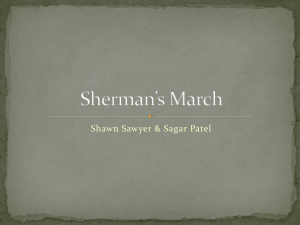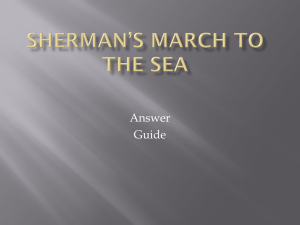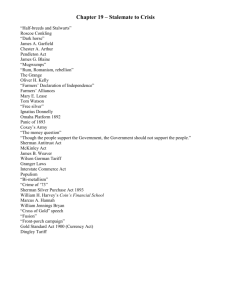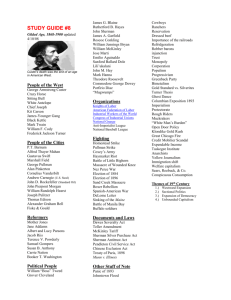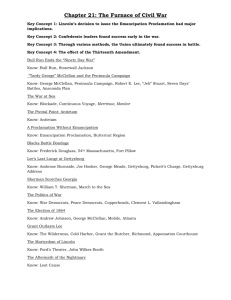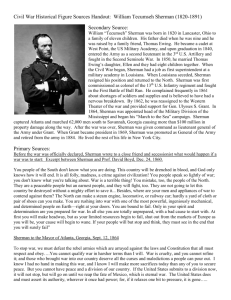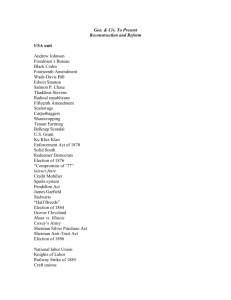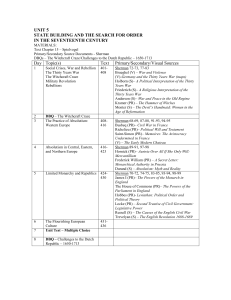High School Lesson Plan and Curriculum Guide
advertisement
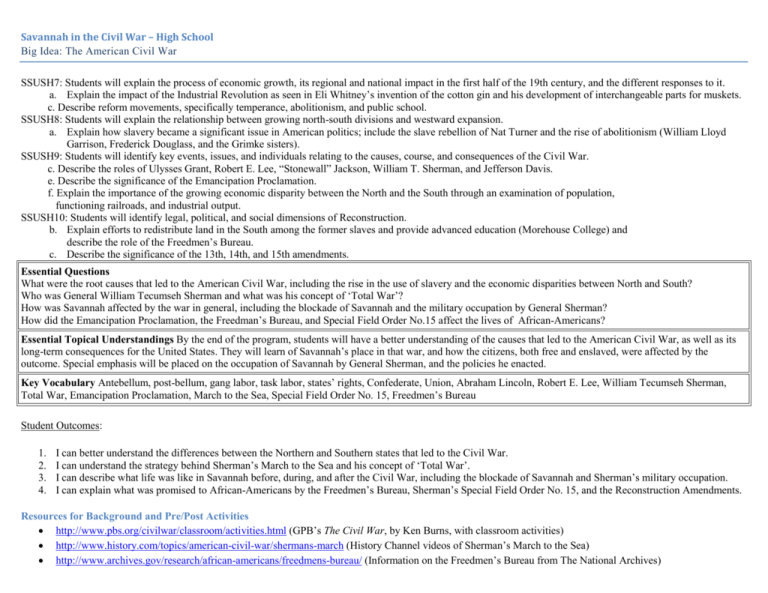
Savannah in the Civil War – High School Big Idea: The American Civil War SSUSH7: Students will explain the process of economic growth, its regional and national impact in the first half of the 19th century, and the different responses to it. a. Explain the impact of the Industrial Revolution as seen in Eli Whitney’s invention of the cotton gin and his development of interchangeable parts for muskets. c. Describe reform movements, specifically temperance, abolitionism, and public school. SSUSH8: Students will explain the relationship between growing north-south divisions and westward expansion. a. Explain how slavery became a significant issue in American politics; include the slave rebellion of Nat Turner and the rise of abolitionism (William Lloyd Garrison, Frederick Douglass, and the Grimke sisters). SSUSH9: Students will identify key events, issues, and individuals relating to the causes, course, and consequences of the Civil War. c. Describe the roles of Ulysses Grant, Robert E. Lee, “Stonewall” Jackson, William T. Sherman, and Jefferson Davis. e. Describe the significance of the Emancipation Proclamation. f. Explain the importance of the growing economic disparity between the North and the South through an examination of population, functioning railroads, and industrial output. SSUSH10: Students will identify legal, political, and social dimensions of Reconstruction. b. Explain efforts to redistribute land in the South among the former slaves and provide advanced education (Morehouse College) and describe the role of the Freedmen’s Bureau. c. Describe the significance of the 13th, 14th, and 15th amendments. Essential Questions What were the root causes that led to the American Civil War, including the rise in the use of slavery and the economic disparities between North and South? Who was General William Tecumseh Sherman and what was his concept of ‘Total War’? How was Savannah affected by the war in general, including the blockade of Savannah and the military occupation by General Sherman? How did the Emancipation Proclamation, the Freedman’s Bureau, and Special Field Order No.15 affect the lives of African-Americans? Essential Topical Understandings By the end of the program, students will have a better understanding of the causes that led to the American Civil War, as well as its long-term consequences for the United States. They will learn of Savannah’s place in that war, and how the citizens, both free and enslaved, were affected by the outcome. Special emphasis will be placed on the occupation of Savannah by General Sherman, and the policies he enacted. Key Vocabulary Antebellum, post-bellum, gang labor, task labor, states’ rights, Confederate, Union, Abraham Lincoln, Robert E. Lee, William Tecumseh Sherman, Total War, Emancipation Proclamation, March to the Sea, Special Field Order No. 15, Freedmen’s Bureau Student Outcomes: 1. 2. 3. 4. I can better understand the differences between the Northern and Southern states that led to the Civil War. I can understand the strategy behind Sherman’s March to the Sea and his concept of ‘Total War’. I can describe what life was like in Savannah before, during, and after the Civil War, including the blockade of Savannah and Sherman’s military occupation. I can explain what was promised to African-Americans by the Freedmen’s Bureau, Sherman’s Special Field Order No. 15, and the Reconstruction Amendments. Resources for Background and Pre/Post Activities http://www.pbs.org/civilwar/classroom/activities.html (GPB’s The Civil War, by Ken Burns, with classroom activities) http://www.history.com/topics/american-civil-war/shermans-march (History Channel videos of Sherman’s March to the Sea) http://www.archives.gov/research/african-americans/freedmens-bureau/ (Information on the Freedmen’s Bureau from The National Archives)

